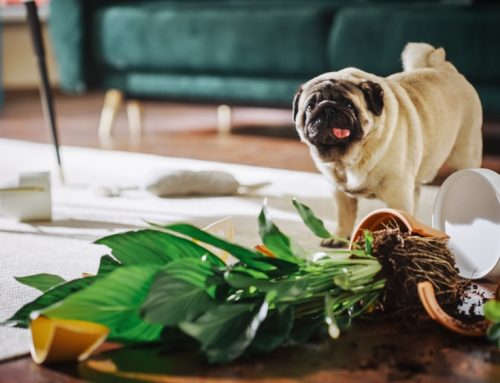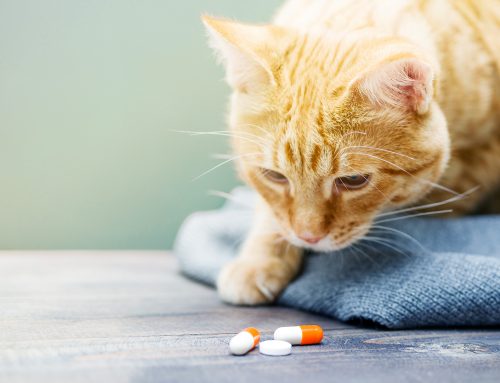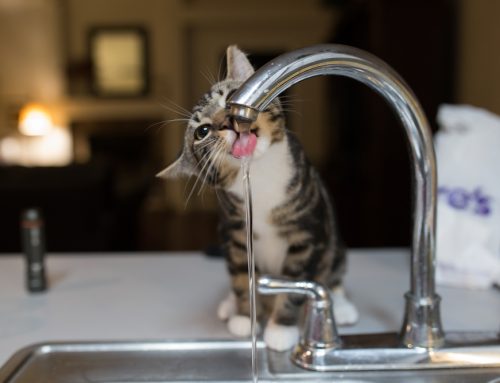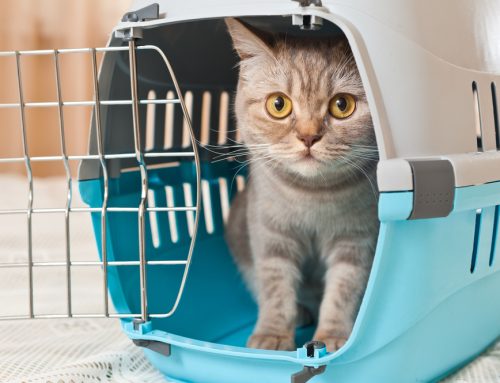Your pet is inquisitive, but their investigative nature can cause problems if they encounter a toxic substance. However, while many common household items are dangerous for your pet, you can take precautions to keep them safe. Our Fear Free Star of Texas Veterinary Hospital team wants to help by offering tips to safeguard your pet from common household toxins.
#1: Keep all garbage in sealed containers and out of your pet’s reach
Many common foods are toxic to pets, and ingestion can cause significant health issues. Keeping your trash in sealed containers will help prevent your pet from dumpster diving and finding any off-limits morsels. Dangerous foods include:
- Chocolate — Chocolate is a problem for pets in any form, including candy, baked goods, and sauces, and the darker the chocolate the more toxic for your pet. Chocolate contains caffeine and theobromine, which cause cardiovascular and central nervous system stimulation in pets. Signs include restlessness, panting, vomiting, diarrhea, and seizures.
- Onions — All vegetables in the Allium family, including onions, garlic, leeks, shallots, and chives, contain a toxin called N-propyl disulphide, which causes oxidative damage to your pet’s red blood cells, and can lead to anemia. Signs include pale mucous membranes, reddish urine, weakness, and fainting.
#2: Keep your counter tops free from food and drinks to avoid tempting your pet
Some pets love to counter surf, and they may find a forbidden morsel when they investigate. Keep your counters free from food and drink, including crumbs, so your pet won’t be tempted. Dangerous foods your pet could find on your counter include:
- Alcohol — Pets are extremely sensitive to alcohol, and a small amount can have detrimental consequences. Signs include incoordination, drooling, vomiting, and collapse.
- Grapes — Grapes and raisins cause kidney damage, resulting in increased thirst and urination, lethargy, and decreased appetite.
- Macadamia nuts — These nuts cause a syndrome that results in lethargy and muscle weakness, especially in the hind limbs.
#3: Keep your prescription medications in a secure location and out of your pet’s reach
Many human prescription medications are dangerous for pets. These include:
- Antidepressants — Medications, such as tricyclic antidepressants, monoamine oxidase inhibitors, and selective serotonin reuptake inhibitors, are harmful to pets, and cause signs including vomiting, diarrhea, sedation or stimulation, seizures, and hyperthermia.
- Heart medications — Drugs, including beta blockers and ace inhibitors, can cause your pet’s heart rate to slow, and drastically lower their blood pressure. Signs include weakness and collapse.
- Anti-anxiety medications — Drugs, such as benzodiazepines, can cause severe lethargy, incoordination, and slowed breathing in pets. In addition, they can cause liver failure in cats.
#4: Ensure your pet cannot access your guest’s coats and purses
You can’t blame your pet for wanting to investigate the new smells of a stranger’s belongings, but they could come across a dangerous substance in your guest’s pocket.
- Acetaminophen — Many people have acetaminophen on hand should a headache make an appearance, but this drug can cause significant problems for your pet. The medication limits their red blood cells’ ability to carry oxygen, and in some cases, causes liver damage.
- Ibuprofen — Nonsteroidal anti-inflammatories work by blocking COX 2 inhibitors to reduce inflammation, but they also block COX 1 inhibitors, which are important to maintain many important body functions. Problems for pets include stomach and intestinal ulcers, and, in some cases, kidney failure.
- Xylitol — Xylitol, which is commonly found in sugar-free candies and mints, causes severe hypoglycemia in pets. Signs include incoordination, weakness, and seizures.
#5: Keep household products out of your pet’s reach
Keep all household products in a secure cabinet or closet inaccessible to your pet, and never use these products when your pet is near.
- Rodenticides — These products are made to be tempting for rodents, and are appetizing to pets, too. All the rodenticides on the market are harmful to your pet.
- Bleach — Bleach can cause significant burns to your pet’s skin or gastrointestinal tract, if swallowed. Keep your pet out of areas where you are cleaning, so they do not get bleach on their fur or paws.
- Fertilizer — Some pets find fertilizers palatable, but these products contain ingredients such as copper, iron, ammonium, and zinc, that can be harmful. Signs include vomiting, diarrhea, lethargy, and abdominal pain.
- Antifreeze — Many antifreeze products contain ethylene glycol, which is sweet-tasting and tempting to pets. Only a small amount can have dire consequences for your pet, causing severe kidney damage. Signs include incoordination, vomiting, excessive urination and thirst, seizures, and coma.
#6: Do not let your pet have access to toxic plants

Refrain from bringing toxic plants into your home, if possible, but if you do, keeping them out of your pet’s reach is vital.
- Lilies — All parts of the lily plant, including the water in the vase, are extremely poisonous to pets, especially cats. These beautiful flowers cause severe kidney damage in cats, as well as gastrointestinal signs, including vomiting, drooling, and diarrhea.
- Tulips — These plants contain allergenic lactones, which are harmful to pets. Signs include drooling, vomiting, diarrhea, and difficulty breathing.
- Amaryllis — This plant contains lycorine, which causes increased salivation, vomiting, diarrhea, and abdominal pain in pets.
Following these tips will help safeguard your pet from dangerous household toxin encounters. If you know or suspect your pet has ingested a toxic substance, immediately contact Star of Texas Veterinary Hospital or Pet Poison Control to get them the help they need.






